Center for Louisiana Studies Archival Catalog
This searchable database provides information on images, documents, and audio and video recordings, made between 1934 and the present.
1959 National Folk Festival, Nashville, TN
1959 National Folk Festival, Nashville, TN, L-R: Mady Guillory (seated with fiddle), Eloi Landreneau (standing), Unknown, Don McGee (clown face paint), Unknow, Unknown, Bufford Perron (sitting), Cyprien Landreneau (with accordian)
C. Don and Darlene Landreneau
Rodius McGee (fiddle) and Don Landreneau (singing), Mamou , La Mardi Gras 1981
Rodius McGee (fiddle) and Don Landreneau (singing), Mamou , La Mardi Gras 1981
C. Don and Darlene Landreneau
Dominique Landreneau and Don Landreneau, Mamou, LA Mardi Gras
Dominique Landreneau and Don Landreneau, Mamou, LA Mardi Gras
C. Don and Darlene Landreneau
Dominique Landreneau, Mamou, La Mardi Gras
Dominique Landreneau, Mamou, La Mardi Gras
C. Don and Darlene Landreneau
Mardi Gras 1976, Mamou, LA, Lunch Break L-R: James "Smitty" Smith, Don Landreneau, Annette Deshotel (not a participant), and Peter Augustine
Mardi Gras 1976, Mamou, LA, Lunch Break L-R: James "Smitty" Smith, Don Landreneau, Annette Deshotel (not a participant), and Peter Augustine
C. Don and Darlene Landreneau
Mamou, La Mardi Gras, Capitaine de Mardi Gras James "Boeuf" Fontenot
Mamou, La Mardi Gras, Capitaine de Mardi Gras James "Boeuf" Fontenot
C. Don and Darlene Landreneau
Mamou, La, Mardi Gras runner standing on a horse
Mamou, La, Mardi Gras runner standing on a horse
C. Don and Darlene Landreneau
Mamou, La Mardi Gras, Fuselier Family celebrating, L-R: Gabriel (son), Lloyd (father), Karen (mother), Danielle (daughter)
Mamou, La Mardi Gras, Fuselier Family celebrating, L-R: Gabriel (son), Lloyd (father), Karen (mother), Danielle (daughter)
C. Don and Darlene Landreneau
Mamou, La Mardi Gras, runners leaving town
Mamou, La Mardi Gras, runners leaving town
C. Don and Darlene Landreneau
Mamou, La Mardi Gras, Don Landreneau playing triangle
Mamou, La Mardi Gras, Don Landreneau playing triangle
C. Don and Darlene Landreneau
Mamou, La Mardi Gras, Co-capitaine Michael "Happy" McGee
Mamou, La Mardi Gras, Co-capitaine Michael "Happy" McGee
Mamou, La Mardi Gras, Don Landreneau (black and red) and Dominique Landreneau (back towards camera)
Mamou, La Mardi Gras, Don Landreneau (black and red) and Dominique Landreneau (back towards camera)
C. Don and Darlene Landreneau
Mamou, La Mardi Gras, Don Landreneau holding a chicken
Mamou, La Mardi Gras, Don Landreneau holding a chicken
C. Don and Darlene Landreneau
Mamou, La Mardi Gras, Co-capitaine
Mamou, La Mardi Gras, Co-capitaine
C. Don and Darlene Landreneau
Mamou, La Mardi Gras, Runners getting ready to chase the chicken
Mamou, La Mardi Gras, Runners getting ready to chase the chicken
C. Don and Darlene Landreneau
Mamou, La Mardi Gras, Runners getting ready to chase the chicken
Mamou, La Mardi Gras, Runners getting ready to chase the chicken
C. Don and Darlene Landreneau
Mamou, La Mardi Gras, Patricia McGee taking chickens back to town for the gumbo
Mamou, La Mardi Gras, Patricia McGee taking chickens back to town for the gumbo
C. Don and Darlene Landreneau
Mamou, La Mardi Gras, Runners coming into town after the run
Mamou, La Mardi Gras, Runners coming into town after the run
C. Don and Darlene Landreneau
Mamou, La Mardi Gras, Runners enjoying the music
Mamou, La Mardi Gras, Runners enjoying the music
C. Don and Darlene Landreneau
Mamou, La Mardi Gras, Female onlookers
Mamou, La Mardi Gras, Female onlookers
C. Don and Darlene Landreneau
Mamou, La Mardi Gras, Runners enjoying the music
Mamou, La Mardi Gras, Runners enjoying the music
C. Don and Darlene Landreneau
Contenants - Title and contents page leaf from "Atlas Ameriquain Septentional" 1778
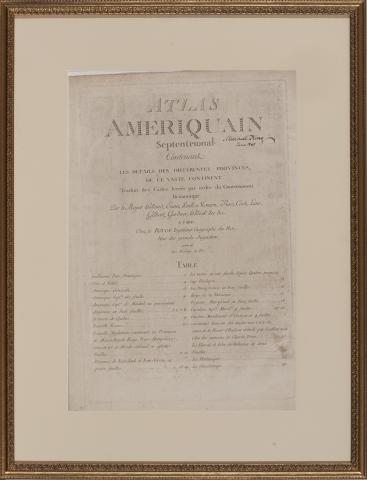
“Contenants,” (Paris: Chez Le Rouge, 1778), the title and contents page is here signed “Mitchell King, Paris 1840,” housed in a gilt wood frame, overall dimensions 29-1/2 x 22-1/4 in.
Description: Title and contents page leaf from "Atlas Ameriquain Septentional" published by Georges–Louis Le Rouge
This set of maps can likely be traced to antebellum Georgia attorney Mitchell King, whose papers are archived at The University of North Carolina, Chapel Hill.
The German-born George-Louis Le Rouge published these maps in Paris at a time when France renewed its active participation in American affairs. The maps meticulously show a rugged North American landscape between Canada and the Gulf of Mexico with details that would aid travelers – and armies - of that era. Accordingly, the Le Rouge maps became highly prized by strategists on both sides of the American Revolution. All plates in the Atlas are copperplate engravings of the period.
Contact us for information about accessing a higher resolution copy
Guillaume Penn Traite Avec Les Indiens
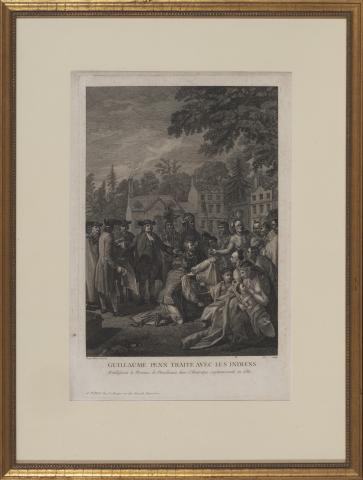
“Guillaume Penn Traite Avec Les Indiens” (Paris: Chez Le Rouge, 1778) after Benjamin West (1772), in gilt wood frame, overall dimensions 29-1/2 x 22-1/4 in.
Description: Title and contents page leaf from "Atlas Ameriquain Septentional" published by Georges–Louis Le Rouge
This set of maps can likely be traced to antebellum Georgia attorney Mitchell King, whose papers are archived at The University of North Carolina, Chapel Hill.
The German-born George-Louis Le Rouge published these maps in Paris at a time when France renewed its active participation in American affairs. The maps meticulously show a rugged North American landscape between Canada and the Gulf of Mexico with details that would aid travelers – and armies - of that era. Accordingly, the Le Rouge maps became highly prized by strategists on both sides of the American Revolution. All plates in the Atlas are copperplate engravings of the period.
Contact us for information about accessing a higher resolution copy
L’Amerique, 1774 map
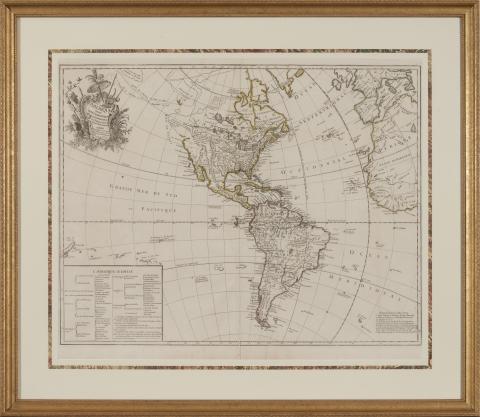
L’Amerique (Paris: Chez Crepy, 1774), after Charlevoix and La Condamine, in a gilt wood frame, 28-1/2 x 33 in. overall dimensions
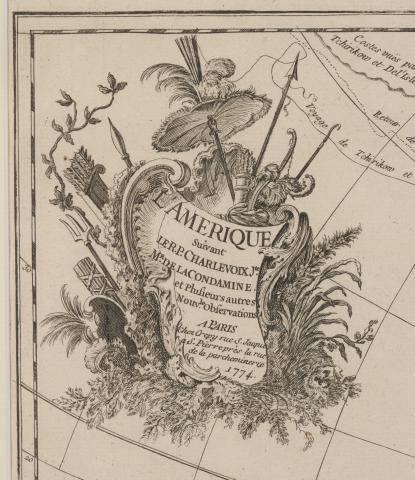
Detail of L’Amerique (Paris: Chez Crepy, 1774)
Description: North and South America map from "Atlas Ameriquain Septentional" published by Georges–Louis Le Rouge
This set of maps can likely be traced to antebellum Georgia attorney Mitchell King, whose papers are archived at The University of North Carolina, Chapel Hill.
The German-born George-Louis Le Rouge published these maps in Paris at a time when France renewed its active participation in American affairs. The maps meticulously show a rugged North American landscape between Canada and the Gulf of Mexico with details that would aid travelers – and armies - of that era. Accordingly, the Le Rouge maps became highly prized by strategists on both sides of the American Revolution. All plates in the Atlas are copperplate engravings of the period.
Contact us for information about accessing a higher resolution copy
Theatre de la Guerre en Amerique, 1777 map
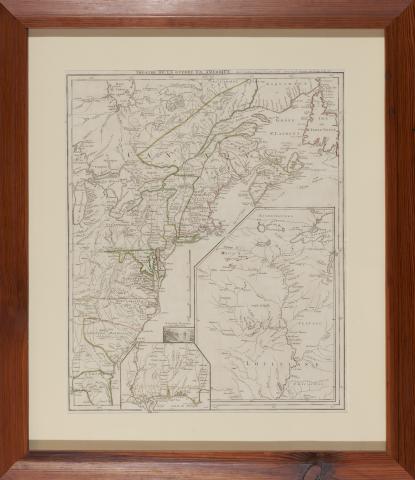
"Amerique Septentrionale" by John Mitchell (Paris: Chez Le Rouge, 1777), Third edition, fourth impression, with outline color and in four vertical sections, each being 54 x 18-3/4 in.
Description: Map from "Atlas Ameriquain Septentional" published by Georges–Louis Le Rouge
This set of maps can likely be traced to antebellum Georgia attorney Mitchell King, whose papers are archived at The University of North Carolina, Chapel Hill.
The German-born George-Louis Le Rouge published these maps in Paris at a time when France renewed its active participation in American affairs. The maps meticulously show a rugged North American landscape between Canada and the Gulf of Mexico with details that would aid travelers – and armies - of that era. Accordingly, the Le Rouge maps became highly prized by strategists on both sides of the American Revolution. All plates in the Atlas are copperplate engravings of the period.
Contact us for information about accessing a higher resolution copy
Carte des Troubles de L’Amerique, 1778 map
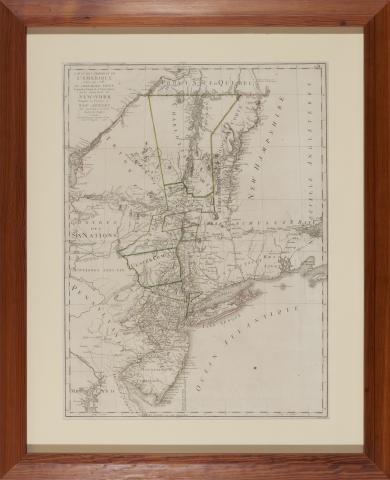
Carte des Troubles de L’Amerique…De la Province de New-York Ensemble la Province de New Jersey, Sauthier & Ratzer (Paris: Chez Le Rouge, 1778), outline color, presented in heart pine frame, overall dimensions 37-1/2 x 34-3/4 inches.
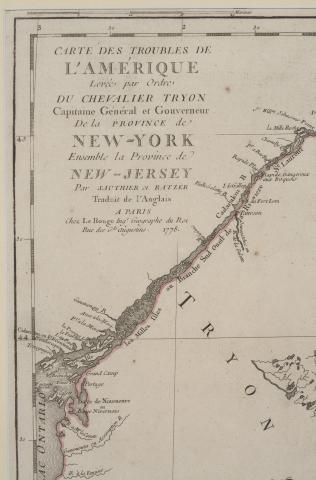
Detail of Carte des Troubles de L’Amerique…De la Province de New-York Ensemble la Province de New Jersey
Description: Map page leaf from "Atlas Ameriquain Septentional" published by Georges–Louis Le Rouge
This set of maps can likely be traced to antebellum Georgia attorney Mitchell King, whose papers are archived at The University of North Carolina, Chapel Hill.
The German-born George-Louis Le Rouge published these maps in Paris at a time when France renewed its active participation in American affairs. The maps meticulously show a rugged North American landscape between Canada and the Gulf of Mexico with details that would aid travelers – and armies - of that era. Accordingly, the Le Rouge maps became highly prized by strategists on both sides of the American Revolution. All plates in the Atlas are copperplate engravings of the period.
Contact us for information about accessing a higher resolution copy
Nouvelle Carte des Cotes des Carolines, 1777 map
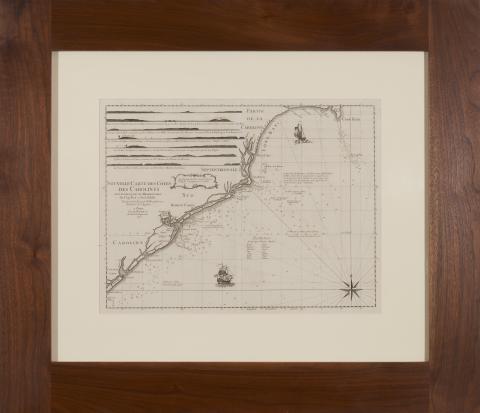
Nouvelle Carte des Cotes des Carolines by N. Pocock (Paris: Chez Le Rouge, 1777), presented in walnut frame, overall dimensions 32 x 37 inches
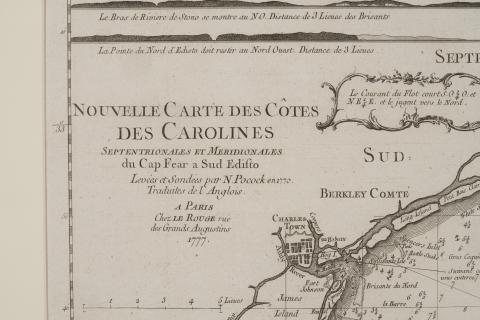
Detail of Nouvelle Carte des Cotes des Carolines
Description: Map page leaf of the Charleston, South Carolina coastal area from "Atlas Ameriquain Septentional" published by Georges–Louis Le Rouge
This set of maps can likely be traced to antebellum Georgia attorney Mitchell King, whose papers are archived at The University of North Carolina, Chapel Hill.
The German-born George-Louis Le Rouge published these maps in Paris at a time when France renewed its active participation in American affairs. The maps meticulously show a rugged North American landscape between Canada and the Gulf of Mexico with details that would aid travelers – and armies - of that era. Accordingly, the Le Rouge maps became highly prized by strategists on both sides of the American Revolution. All plates in the Atlas are copperplate engravings of the period.
Contact us for information about accessing a higher resolution copy
Carte de la Floride Occidentale et Louisiane, 1777 map
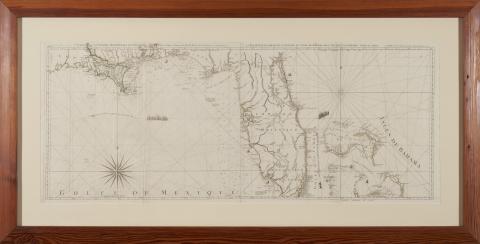
Carte de la Floride Occidentale et Louisiane with La Peninsule et Golfe de la Floride ou Canal de Bahama avec Les Isles de Bahama by Thomas Jefferys (Paris: Chez Le Rouge, 1777), two sheets, outline color, presented in heart pine frame, overall dimensions 29 x 58 inches.
Description: Map page leaf from "Atlas Ameriquain Septentional" published by Georges–Louis Le Rouge that features Southern Louisiana, Florida, and the Bahamas
This set of maps can likely be traced to antebellum Georgia attorney Mitchell King, whose papers are archived at The University of North Carolina, Chapel Hill.
The German-born George-Louis Le Rouge published these maps in Paris at a time when France renewed its active participation in American affairs. The maps meticulously show a rugged North American landscape between Canada and the Gulf of Mexico with details that would aid travelers – and armies - of that era. Accordingly, the Le Rouge maps became highly prized by strategists on both sides of the American Revolution. All plates in the Atlas are copperplate engravings of the period.
Contact us for information about accessing a higher resolution copy
A New Map of Nova Scotia and Cape Breton Island, 1775
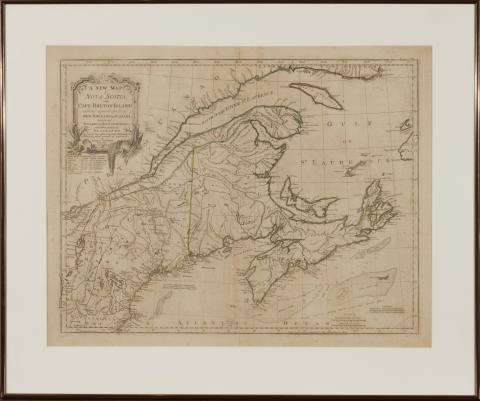
A New Map of Nova Scotia and Cape Breton Island, by Thomas Jefferys (London: R. Sayer & J. Bennett, 1775), presented in copper-toned frame. 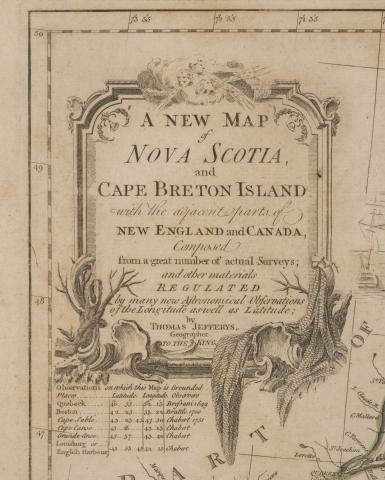
Detail of A New Map of Nova Scotia and Cape Breton Island
Course of the River Mississippi, From Balise to Fort Chartres, 1775 map
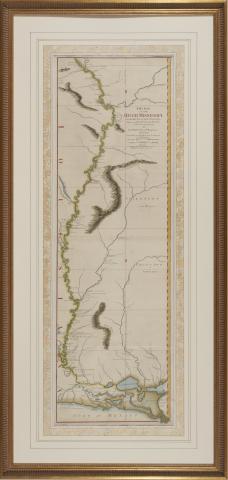
Thomas Jefferys, Course of the River Mississippi, From Balise to Fort Chartres; Taken on an Expedition to the Illinois, in the latter end of the year 1765 by Lieut. Ross of the 34th Regiment: Improved on the Surveys of that River made by the French. (London: Robert Sayer, 1775), hand color, presented in gilt wooden frame, overall dimensions 57 x 27 inches.
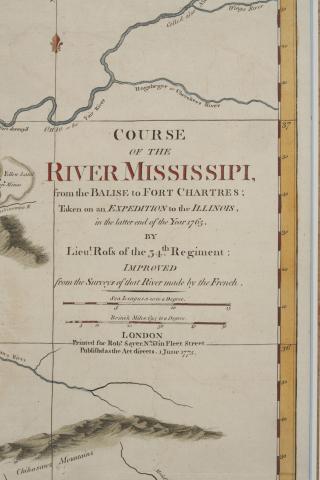
Detail of Course of the River Mississippi, From Balise to Fort Chartres; Taken on an Expedition to the Illinois, in the latter end of the year 1765 by Lieut. Ross of the 34th Regiment: Improved on the Surveys of that River made by the French
Fort Beau Sejour, and the Adjacent Country taken Possession of by Colonel Monckton in June 1755 map
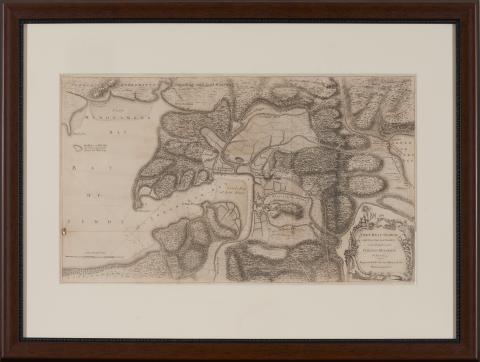
Fort Beau Sejour, and the Adjacent Country taken Possession of by Colonel Monckton in June 1755, Engraved for Mr. Mantes History of the War in America (London: Strahan & Cadell, 1772), presented in wooden frame, overall dimensions 23 x 31 inches
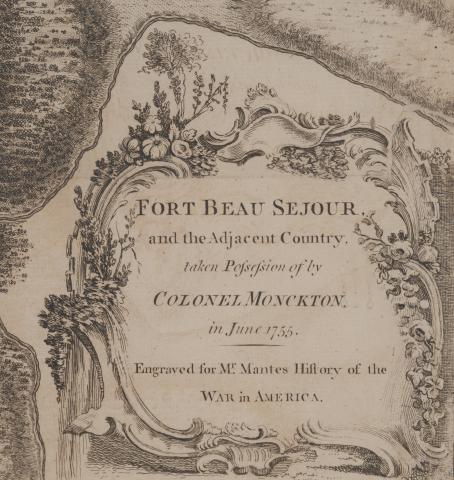
Detail of Fort Beau Sejour, and the Adjacent Country taken Possession of by Colonel Monckton in June 1755
Plan of the Attack and Defence of the American Lines below New Orleans on the 8th of January map
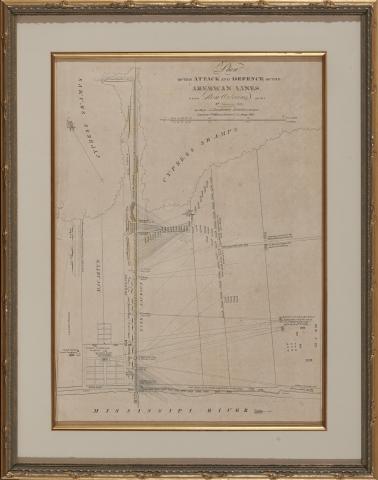
Plan of the Attack and Defence of the American Lines below New Orleans on the 8th of January, 1815. from Latour, Arsene Lacarriere. Historical Memoir of the War in West Florida and Louisiana in 1814 – 1815 (Philadelphia: John Conrad & Co., 1816), in gilt wooden frame, overall dimensions 12 x 16 inches.
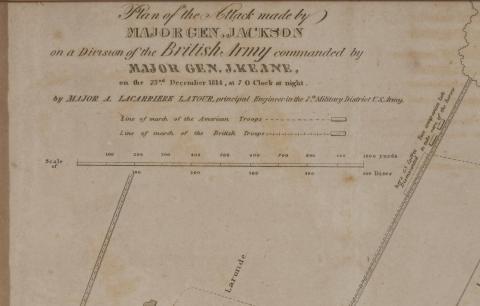
Detail of Plan of the Attack and Defence of the American Lines below New Orleans on the 8th of January.
Plan of the Attack Made by Major Gen. Jackson on a Division of the British Army commanded by Major Gen. J. Keane on the 23rd December 1814, at 7 O Clock at night map
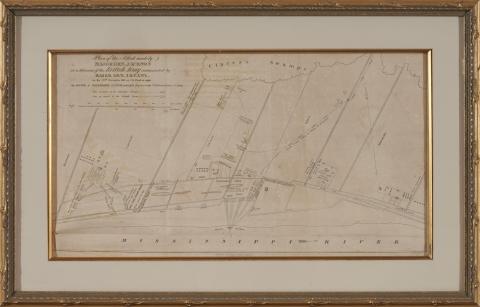
Plan of the Attack Made by Major Gen. Jackson on a Division of the British Army commanded by Major Gen. J. Keane on the 23rd December 1814, at 7 O Clock at night. from Latour, Arsene Lacarriere. Historical Memoir of the War in West Florida and Louisiana in 1814 – 1815 (Philadelphia: John Conrad & Co., 1816), in gilt wooden frame, overall dimensions 14 x 21-1/2 inches.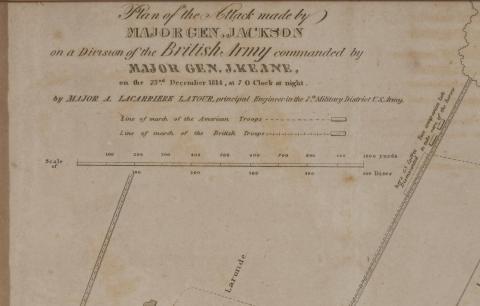
Detail of Plan of the Attack Made by Major Gen. Jackson on a Division of the British Army commanded by Major Gen. J. Keane on the 23rd December 1814, at 7 O Clock at night.
Carte de la Louisiane Par Le St. D’Anville Dressé en Mai 1732- 1752 map
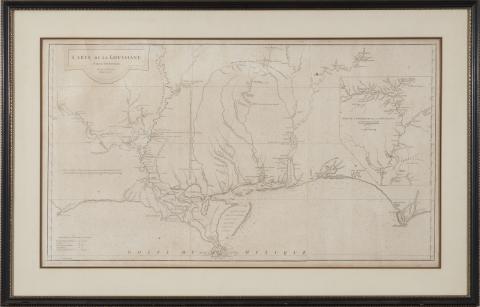
Carte de la Louisiane Par Le St. D’Anville Dressé en Mai 1732. Publiée en 1752. (Paris, 1752), showing the Gulf coast from Louisiana eastward to the Florida panhandle, presented in wooden frame, overall dimensions 29 x 45 inches.
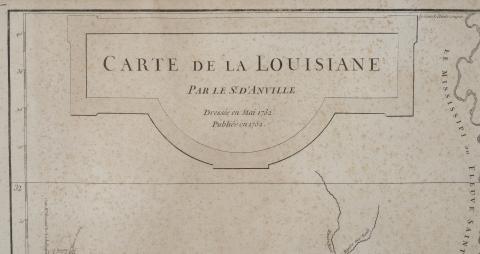
Detail of Carte de la Louisiane Par Le St. D’Anville Dressé en Mai 1732. Publiée en 1752.
Louisiana map 1813/1814
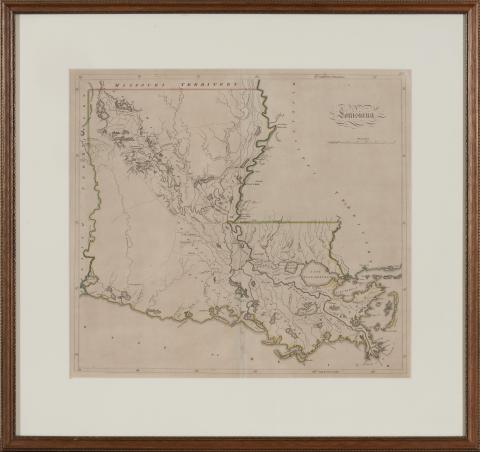
Louisiana (Philadelphia, Matthew Carey & Son, 1813/4), outline color, presented in wooden frame, overall dimensions 21 x 24 inches.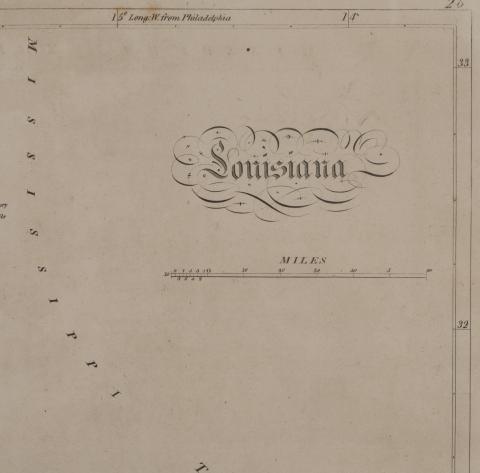
Detail from Louisiana 1813 / 1814
Geographical, Statistical, and Historical Map of Louisiana, 1822 map
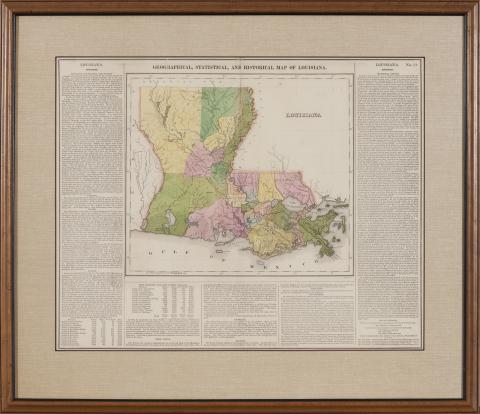
Geographical, Statistical, and Historical Map of Louisiana (Philadelphia: Carey & Lea, 1822), presented in a wooden frame, overall dimensions 23-1/2 x 25 inches.
Plan of New Orleans the Capital of Louisiana, 1761 map
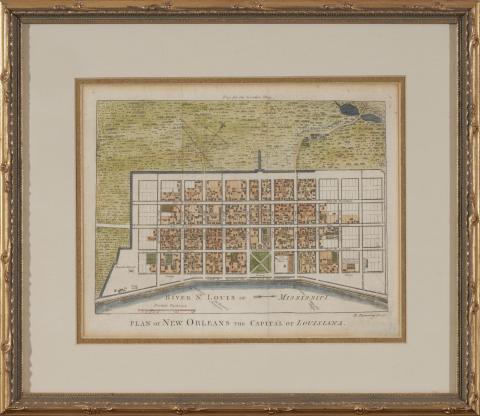
Plan of New Orleans the Capital of Louisiana, engraved by Robert Benning for the April 1761 issue of London Magazine, hand color, gilt wooden frame, overall dimensions 13 x 14-1/2 inches.
Map of the States of Mississippi, Louisiana and the Arkansas Territory, 1832
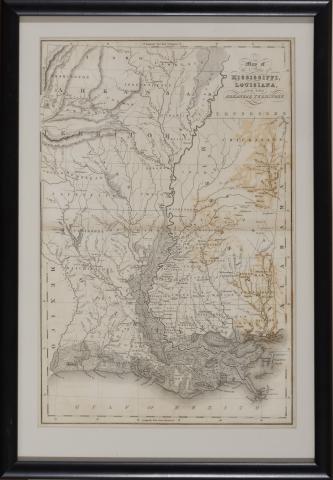
Map of the States of Mississippi, Louisiana and the Arkansas Territory (1832), by John Hinton presented in black wooden frame, overall dimensions 10-1/4 x 14 inches.
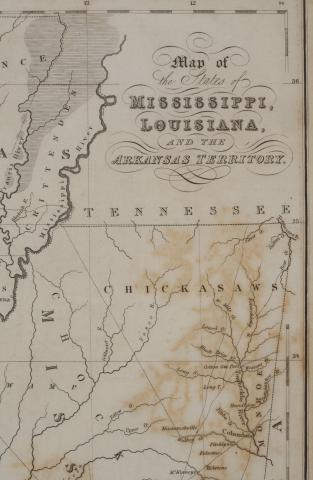
Detail of Map of the States of Mississippi, Louisiana and the Arkansas Territory
Southern Provinces of the United States, 1817 map
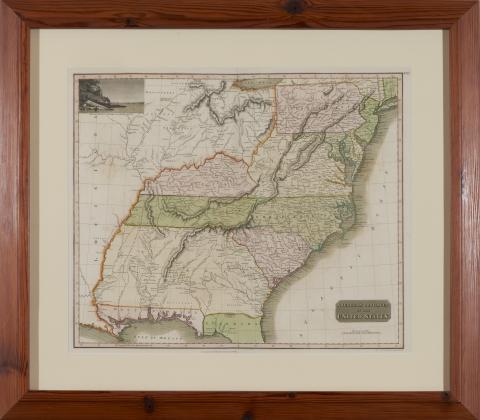
Southern Provinces of the United States (Edinburgh: John Thompson & Co., 1817) by John Thompson, with color, heart pine frame, overall dimensions 30 x 34 inches.
